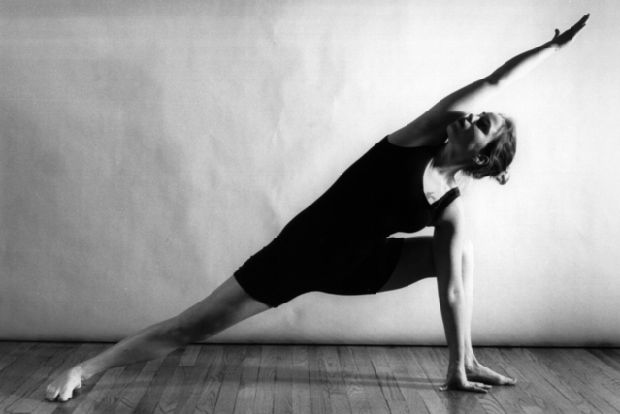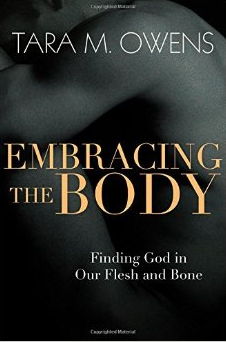Without intending to, I seem to have taken on the role of professional student. First there was a bachelor’s degree, followed a few years later by a master’s degree (spread out over six years while working full-time). I thought after that I was done, but two-and-a-half years later I started what turned out to be two-and-a-half years of prerequisites for another master’s degree in a completely different field than either of my previous degrees. Learning, it seems, is integral to who I am. Embracing the life of the mind comes naturally to me, and the classroom is a comfortable, if not always easy, habitat for me.

Inhabiting my body, however, has not come as easily. Despite playing sports growing up, I have never felt quite at home in my body. Perhaps it was a result of consistently being one of the tallest in my class and feeling like I stuck out like a giraffe among a herd of horses. Or perhaps it was that I couldn’t always make my body do what I wanted it to — move more quickly, less awkwardly. So though I exercised regularly, I avoided exercise classes, thinking I wasn't athletic enough and not wanting to make a fool of myself.
Likely my discomfort with my body was also connected to the conflicting attitudes about the body present in our culture and in the church. We live in a culture that is obsessed with the body, and a particular type of body at that. At every turn we are presented with opportunities to indulge our bodily desires, whether for food, sex, or any number of other urges. In protest, seemingly, to the culture’s obsession, the church tends to be decidedly quiet regarding the body, except for the occasional reminder of its ability to lead us astray and our need to keep our desires and impulses in check.
So I have spent most of my life feeling constrained by my body, viewing it as something to be tolerated at best, wrestled into submission at worst.
In the fall of 2009, however, I found myself in a season of intense grief and overwhelming stress. With no emotional margin left, I knew that preventing a full-on meltdown would require intentional self-care; I would have to learn to listen to my body and trust it to tell me what it needed. And so I went to bed some nights at eight o’clock. I created space to let myself cry. I made soup. I signed up for a Pilates class.
As I pressed into these practices and new rhythms, my appreciation for my body slowly began to change. The extra sleep gave me energy to push through those challenging days. My view of food changed. Instead of seeing it as something to fear or just a means of quelling hunger, I came to see it as a source of nourishment, providing my body with the nutrients and the energy it needs for me to thrive. And the Pilates class was challenging but doable. When that ended, I signed up for a different, more challenging, class. I discovered that though I may not be the most coordinated person in the room, I’m more coordinated than I thought. And it was empowering to feel my body getting stronger even as I was in such a fragile place emotionally.
 In that difficult season, healing came as a result of paying attention to my body and through gifts received through my body. The more I moved into embodied awareness, the more I longed to help others, particularly those in the church, view their bodies more redemptively. Tara Owens’s book Embracing the Body does just that, offering a theology of the body that is much needed in the church today.
In that difficult season, healing came as a result of paying attention to my body and through gifts received through my body. The more I moved into embodied awareness, the more I longed to help others, particularly those in the church, view their bodies more redemptively. Tara Owens’s book Embracing the Body does just that, offering a theology of the body that is much needed in the church today.
Owens helps us see that our bodies are not counter to our spirituality; rather, they are integral to life with God. She writes, “Our participation in worship, in community, in Communion is all predicated on our bodies.” In order to fully participate in the kingdom of God here on earth, we must do it through our bodies — bodies given to us by God who took on a body of his own. She continues: “We’ve lost the sweat and blood and tears and flesh of that radical entry [of Christ] into our world.... In so doing, we’ve lost a large part of what God brought into our lives that holy night — the redemption of our bodies and a pathway to knowing God intimately within them.”
Part of the fear in the church connected to our bodies is that they give birth to our desires. Yet rather than viewing desire as dangerous, Owens points out that desire is the impetus for any movement in life. We must be awake to our desires and longings in order to act. Yes, it’s true that our desires will not always be in line with how we are called to live as God’s children, but refusing to acknowledge them will not make them go away; on the contrary, it will likely add fuel to them. Our ability to offer our bodies as living sacrifices, as Paul urges in Romans 12:1, “is made possible by our choices to live aware of the fears and uncertainties we experience when it comes to our bodies. The more we live in the fertile space of desire, attention and risk, the better able we are to give all of ourselves to God rather than just the ‘pretty,’ ‘acceptable’ or ‘pure’ parts.”
Not all the desires and sensations we experience will be pleasant — there will surely be some that cause pain — but if we aren’t willing to be present to the difficult and uncomfortable sensations, neither can we be present to the beauty of this world.
So how do we begin to live more integrated lives? We start, as I learned during my hard year, by simply paying attention to what our bodies are telling us. “Believing that what you feel in your body matters is a first step in being able to listen attentively to what it’s saying, and what God might be whispering through it.” Are you tired? Hungry? Lonely? Allow those messages to remind you of the good gift of our bodies that enable us to take in the beauty of a sunset, the scent of freshly cut grass, the gentle touch of a friend or spouse, the juicy deliciousness of watermelon on a hot day. And let them lead you deeper into the presence of our loving God who created us body and soul and invites us to bring our whole self to him.